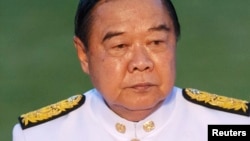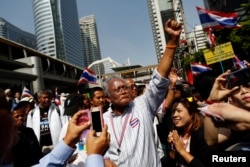Thailand’s military government and constitutional drafting commission are in a stand-off after the Cabinet called for a new charter to include a non-elected senate and an appointed prime minister over transitional five year period. The government’s proposals have triggered sharp reactions from major political parties amid warnings of potential conflict if the proposals are included in the new constitution.
The commission’s draft allows for the election of a 500 member House of Representatives. A 200 member senate would be elected by interest groups and organizations.
But the government’s proposals call for a 250 member appointed Senate, including reserved seats for the permanent secretary of defense, supreme commander, and commanders of army, navy and air force and the chief of police.
Thai Deputy Prime Minister Prawit Wongsuwon said the military’s proposal was aimed at preventing a coup, not to move against the elected House of Representatives. But analysts and politicians from Thailand’s major parties have been critical, saying such moves will weaken political parties and undermine democracy.
Siripan Nogsuan Sawasdee, a political scientist at Chulalongkorn University, speaking at a seminar on constitutional reform, said such proposals will undermine the elected government.
“If there will be elections after this constitution passes the elected political institutions will be paralyzed and overshadowed by the non-elected organizations. What Thailand will have is elections without democracy. When we create institutions that violate basic constitutional principles, like allowing a non-elected prime minister, we lay the ground work for tyrannical decisions. That is a very sensitive point for me,” she said.
The military has said the proposals are necessary to promote political stability after years of turbulence largely between supporters and opponents of populist former Prime Minister Thaksin Shinawatra, who was ousted in a 2006 coup and now lives in self-imposed exile to avoid a jail sentence.
Norachit Sinhaseni, spokesperson for the drafting commission, would not be drawn into the cabinet’s charter proposals, but said the commission’s draft is aimed at ending the bouts of political instability.
“Principles I think is clear. How can we bring Thailand back to democracy away from conflict, the confrontation and the violence, the protest in the streets and as mentioned, how do we wither possible corruption and of course giving people the power to elect their own representatives,” he said. “The stakes, let me say, are very high. If we succeed then we have some time of normalcy. If we fail I think the projection [sic] of confrontation among groups is very high.”
Ake Tangsupvattana, dean of political science at Chulalongkorn University, said the commission’s draft charter may provide the means for moving Thailand beyond past political conflicts.
“What is going to be the direction in the future? Are we going to move back to semi-democracy or is this a constitution suitable in the context of Thailand today and then move Thailand beyond political conflict and maybe look in a positive way -- move Thailand to be a more democratic society,” he said.
Ake expects negotiations between the Cabinet and commission will seek a compromise before the March 29 deadline for the document to be forwarded to the Cabinet.
Thailand’s shifting political power comes amid a sensitive period with the 88-year-old Thai monarch, Bhumipol Adulyadej, ailing. His son and heir, 63-year-old Maha Vajiralongkorn, has yet to achieve the level of reverence given to his father, who has been on the throne for more than 60 years and is the world’s longest reigning monarch.
Thailand’s current draft constitution will be the 20th charter – if it passes a referendum later this year – to be adopted since the country became a constitutional monarchy in 1932.
The latest draft is the second since the military took power in a coup in May 2014. An earlier version was voted down by the national assembly last year.
A referendum on the new charter is planned for August 7. But analysts say if the draft charter is rejected, the military will put forward its own document without going through a drafting committee or a referendum.






